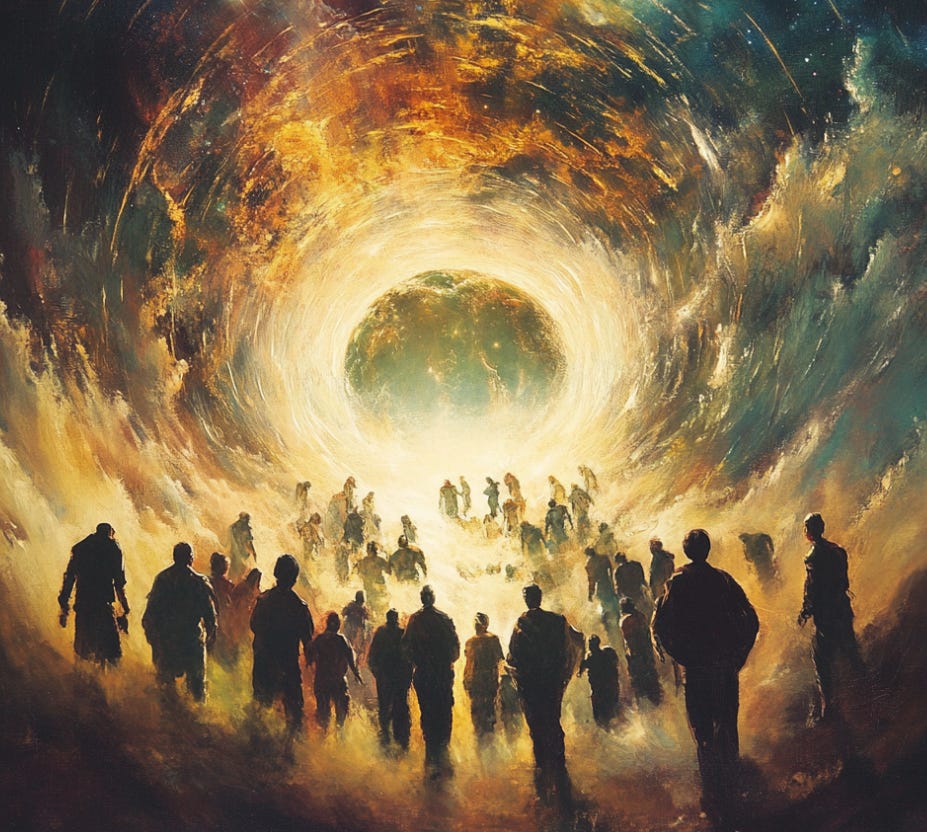The Science of Love, Power and Precognition

[This article has a 7/10 Woo Rating]
Last month, The Onion published a satirical article titled “Pentagon Warns China Developing Love, The Greatest Weapon Of All.”
“The alert, issued to the American public and top U.S. allies, stated that China had made significant advances in love, a transcendent source of strength that ultimately triumphs over any defenses an enemy might try to erect against it.”
Like all good humour, it points at deeper truth. Virtually every spiritual or mystical tradition emphasizes that love is the most potent force in the Universe. So it’s curious that any mention of love is noticeably absent from our most powerful industries of tech and finance, as well as from science itself.
This is changing, and rapidly.

What is Love? (Baby don’t hurt me)
I spoke to Dr. Julia Mossbridge, an expert on the science of love and time, and her collaborator Dr. Eric Smith, Executive Director of The Institute for Love and Time (TILT). Our conversation introduced me to at least three different concepts I’d never even thought of before. You can listen on Spotify or Apple Podcasts.
Our most common cultural definition of love is as a conditional human emotion. “I love this/you because...”. Dr. Mossbridge’s definition1 of unconditional love is totally different:
Unconditional love is the heartfelt, benevolent desire that everyone and everything - ourselves, others, and all that exists in the universe - reaches their greatest possible fulfillment, whatever that may be. This love is freely given, with no consideration of merit, with no strings attached, with no expectation of return, and it is a love that motivates supportive action in the one who loves.
She compares being in a state of unconditional love to walking out into the sun. It’s an experience of a force that’s not generated by you, or anyone you know.
My first awareness of Dr. Mossbridge’s work was reading her claim that precognitive ability increases in a state of unconditional love. It’s always a surprise to people that are unfamiliar with the scientific literature that precognition is one of the oldest and best validated psi phenomena.2 In this context, precognition is defined as the capacity to retrieve from your unconscious mind information about an event that would then be randomly selected in future. While this immediately upends our contemporary conceptions of time and space, she also believes this ability is teachable. Keeping note of your dreams seems to be the initial entrypoint for most people, but it can be turned into a more formal practice (Dr. Mossbridge has specifically explained how).3 Moreover, she has noticed that the people who cultivate these skills also tend to get more loving and at peace with the world. A pretty valuable externality.
It’s worth considering why this might be true. Dr. Mossbridge has referred to unconditional love as “the container for the Universe.” By intentionally fostering a sense of connection and openness, you allow yourself to align with that force. If unconditional love operates beyond space and time, then your consciousness might also gain access to intuitive abilities that transcend space and time.
In our conversation, she noted a confusing paradox. When you have the experience that nothing needs to change in order for you to feel loved and to love, suddenly everything does change. And you love that too. As I would put it in the broader context of my work, being in a state of unconditional love aligns you with “attractor intelligence.”4
Obviously there’s nothing novel about this force. What’s new is that we are gaining a fresh understanding of love as a transcendent power. Whether it’s unity consciousness, psi or non-human intelligence, unconditional love is the underlying theme of the higher woo-rating topics that are increasingly going mainstream. In fact, I often wonder if we had a new scientific-sounding word for it, like “emergentia” or “cosmovitality” we might take it far more seriously. It’s also important to note that, as far as we know, artificial intelligence has no access to this force.5 This gives human consciouness a sustainable edge, but one that needs to be deliberately cultivated.
Love in Business
The Institute for Love and Time (TILT), is focused on infusing our existing systems with unconditional love. It’s a common misperception that a business grounded in unconditional love is somehow weaker. Dr. Mossbridge has specifically addressed that myth,6 using the example of firing an employee:
Within conditional love, if I ask you to leave a company, it means I don’t love you. But in reality, it could be a powerful expression of my unconditional love for you to ask you to leave the company. It’s just not a match. At the same time, I see clearly that you don’t need to change in order to be loved. You would have to change to stay at the company, or the company would have to change — or both. But to be loved? Nothing needs to change. Or said another way, when I am experiencing unconditional love, everything I do is an expression of that unconditional love. It’s like I’m in a bubble of love and it includes everything.
Unlike conditional love, unconditional love makes workplaces, companies and networks stronger. TILT’s Dr. Smith argues that it allows employees to feel safe enough to speak the truth. It also prevents what he calls “KPI lock,” where poor incentive structures lead to everyone following individualistic, flawed or limited goals. In contrast, a group bound by unconditional love is more flexible at adapting their goals to fit changing circumstances and works harder for the good of the entire organization.7
A tremendous recent piece8 from
Daniel Thorson envisioned an “infinite game” future where networks are organized around the principles of love. He believes that networks based on love can "outcompete" traditional power structures “through sheer coherence and efficiency. Love, it turns out, is simply better at organizing complexity than fear.” This leads to 4 positive outcomes:
- Resources flow naturally across boundaries
- Collaboration emerges organically, untainted by hidden agendas
- Innovation serves genuine needs rather than manufactured wants
- Adaptation happens fluidly, guided by love's intelligence rather than fear's demands
And as Dr. Mossbridge dryly observed, having employees that can intuit the future is unlikely to be a bad thing.
Love in Practice.
As with all my work, I’m interested in the conceptual ideas, but also the practical application to our daily lives. We’ve already discussed how precognition can be taught, and TILT is developing their own technology to cultivate the power of unconditional love.
Dr. Mossbridge and Dr. Smith have developed a free app called Time Machine (download it here). They describe how and why it works in greater detail in our conversation. But in short, one of the three features is making a daily one minute voice recording responding to a prompt about your past, present or future self. The next day you listen to the previous clip and record a new one. They believe this “time-travel therapy” has a positive impact on people’s ability to access unconditional love, which is directly correlated with increases in overall wellbeing.
One of the key innovations Dr. Mossbridge discussed with us is the transition from an attention economy to an intention economy. This will be done through the evolution of “consciousness technology.” We are increasingly discovering that human consciousness can have measurable effects on the world around us. Actively harnessing our individual or collective intention towards positive goals takes us beyond a parasitic social media industry that has misdirected and monetized our passive attention. I’ve been experimenting with the Time Machine app for a few weeks and I’d note that, because it is deliberately designed to be non-addictive, it requires intention. This means setting a reminder and finding two minutes a day to do it.
In a scientific sense, we don’t know a lot about how to access unconditional love consistently. But Dr. Mossbridge has found that “prayer, pets and babies, positive intention and meditation help.” One of the simplest and most effective practices in The Leading Edge community has been sending love to others, especially people that trigger us.9 In our conversation, Dr. Mossbridge noted that the idea of “sending” love still has a slightly zero-sum connotation: “I’m giving something to you that you didn’t already have.” It’s like pointing your little flashlight at someone. She prefers the idea of sending the intention that the other person stands outside in the sun, in the unconditional love that is already available for all of us.
Subscribed
1 Dr. Mossbridge has written more about the concept and definitions here.
2 Source: Precognition as a form of prospection: A review of the evidence.
3 In this DemystifySci podcast she takes you through a specific exercise to train your precognition (from 1 hour 16 min).
4 See my most popular post ever: Thinking The Unthinkable.
5 Check out my article Robot Heart on this topic for the online magazine Hurry Up We’re Dreaming.
6 Check out this dialogue Dr. Mossbridge conducted with a CEO on the topic of Unconditional Love.
7 This was precisely the same point I made in my recent piece Going Beyond Buffett about pursuing dynamic quality in business. Due to our cultural discomfort with the word love in the business context, we tend to dress it up in terms like “workplace empathy, culture, leadership styles or psychological safety.” A transformational leadership style that produces psychological safety requires a degree of unconditional love. This is because that leader must be able to recognize that everyone is doing the best they can from their current state of consciousness. Kevin Lowe has done a meta-analysis finding that this was a strong predictor of positive business outcomes.
9 The Most Powerful (and easiest) Spiritual Practice I've Found by Bodhi




